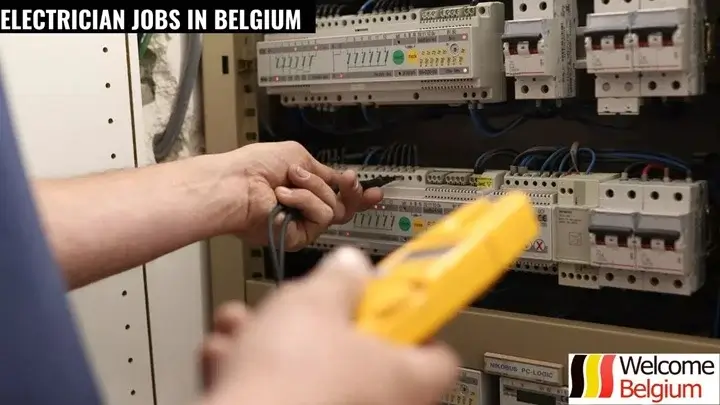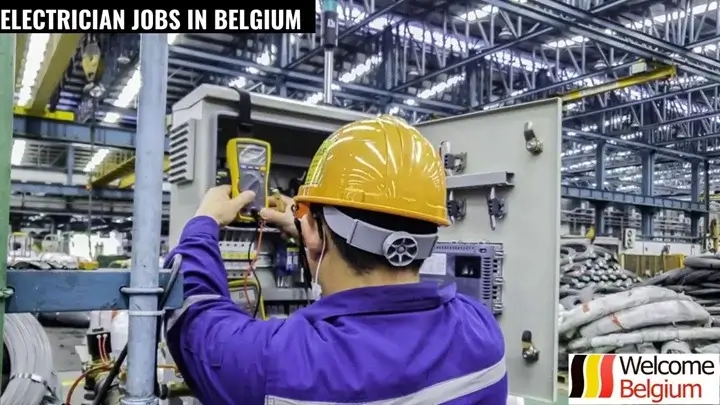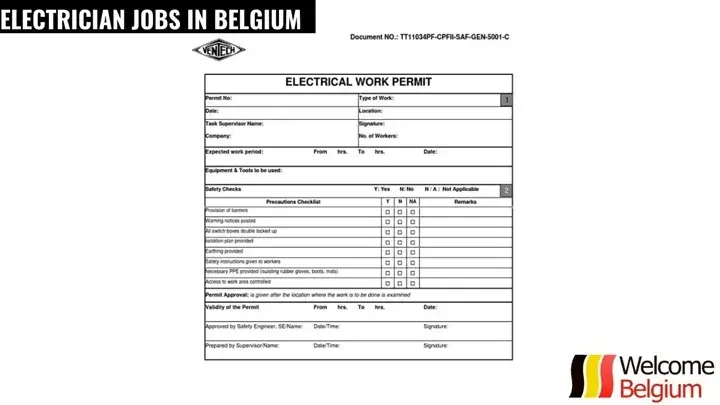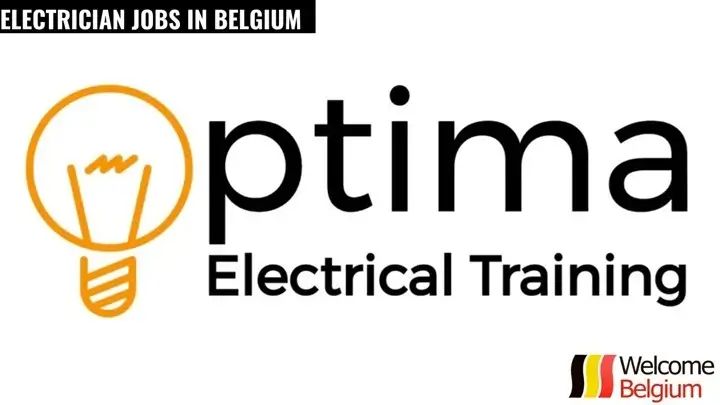Electrician jobs in Belgium remain steadily in demand thanks to the growth of industry and the construction sector. The need for electricians stays high — specialists are required both for new projects and for maintaining existing facilities. Electrician salaries in Belgium are notably higher than in many other countries, making this profession especially attractive for qualified workers. In this article, we’ll explain why considering a job as an electrician in Belgium makes sense, what labor market conditions look like, and how to successfully start your career.
Requirements for Electricians in Belgium
To work as an electrician in Belgium, having proper education and experience is important. Employers usually look for specialists with a professional diploma or certificate in electrical installation and electrical safety. Besides basic electrician training, having additional certificates and licenses that confirm your qualification and the right to perform certain types of work is welcomed.
Want to work at the UN in Brussels? Check the requirements in this article.
Work experience plays a key role — usually, a minimum of 2-3 years in a similar position is required. This helps you quickly adapt to the standards and demands of Belgian employers.
To successfully get hired as an electrician in Belgium, it’s important to meet several requirements. Below are key points to consider:
- Confirmation of Education
Belgian employers require official proof of professional education in electrical work. This can be a diploma from a college, technical school, or specialized institution. The education should meet EU standards, so sometimes a nostrification (diploma recognition) procedure is necessary. This confirms that your knowledge and skills meet Belgian requirements. - Proof of Work Experience
Experience as an electrician is an important factor when applying for jobs. Usually, at least 2-3 years of professional experience is needed. Recommendations from previous employers or work records may be required to confirm this. The more practical experience you have, the better your chances to find a good job quickly. - Work Permit for Electricians
non-EU citizens need to obtain a work permit to work legally in Belgium. This official document allows you to work in the country. Getting the permit often involves having a contract from an employer and complying with immigration rules. - Residence Permit for Immigrants
Along with a work permit, foreigners must arrange a residence permit. Belgium offers several types: short-term, long-term, work-related, and family permits. The right type depends on your purpose and type of employment. Without this document, employment is not possible. - Language Skills
Official languages in Belgium depend on the region:
- Flanders — Dutch (Flemish)
- Wallonia — French
- Brussels — bilingual (French and Dutch), English is often used
- Knowing the relevant language is necessary to understand technical documents, communicate with colleagues, and follow safety rules. A minimum B1-B2 level is usually required. Some employers accept English, especially in international companies.
- Additional Courses and Licenses
Electricians should regularly update their training in safety and new technologies. This includes courses on electrical installations, fire safety, and special systems (like security or automation systems). Having such certificates improves your chances for a good job and career growth.
- Confirmation of Education
Language knowledge is another important factor. Depending on the region (Flanders, Wallonia, or Brussels), fluency in Dutch, French, or English is usually required. Without language skills, it will be hard to work with technical documentation and colleagues.
Also, demands for professional development and additional safety or technology courses are constantly growing. Training is considered part of an electrician’s career growth and helps maintain a high skill level.
Tip:
Bro, keep improving your language skills — it’s the key to easy adaptation and success as an electrician in Belgium.
Vacancies and Types of Electrician Jobs in Belgium
In Belgium, several paths exist for working as an electrician, depending on specialization, experience, and the field of application. Vacancies range from maintaining household electrical systems to handling complex industrial projects. The choice depends on your knowledge, qualifications, and desire to develop in a specific direction.
Electrician vacancies in Belgium depend greatly on specialization and industry — from working with household electrical systems to servicing complex industrial equipment. Often, the fields overlap, but each requires different skills and experience. For example, an electrician might specialize in lighting installation, automation, or telecommunications networks. Options depend on your knowledge, qualifications, and career goals.
| Vacancy | Field | Description |
| Telecommunications Electrician | Telecommunications | Installation and maintenance of network and communication equipment. |
| Automation Electrician | Automation | Working with programmable logic controllers (PLC), configuring automatic systems. |
| Electrical Installation Electrician | Construction | Installing wiring, electrical panels, and electrical systems in buildings. |
| Lighting Electrician | Lighting | Designing, installing, and repairing lighting systems in residential and commercial buildings. |
| Welding Electrician | Industry | Servicing and repairing welding equipment, monitoring welding processes. |
| Household Electrician | Residential | Installing and repairing wiring and equipment in homes and apartments. |
| Component Installer | Manufacturing | Installing electrical components and systems in production facilities. |
| Industrial Electrician | Industry | Servicing and repairing electrical equipment in factories and plants. |
Switching between fields is possible if you want to expand your skills and take additional training or courses. For example, an electrician working in household electrical systems may learn automation and move into the industrial sector by studying PLC programming and working with industrial equipment. This often requires earning new certificates and gaining practice under experienced professionals.
Real-life example:
Denis from Antwerp started as a household electrician with a salary of about €1,800 per month. After two years, he completed a PLC programming course using Siemens TIA Portal in Belgium, costing €2,050 for 5 days of training. After obtaining the certificate, he got a job as an industrial electrician at a factory, where his salary increased to €3,200 per month. This transition required investment in education but opened new career opportunities and significantly increased his income.
Working conditions and salary
Electrician jobs in Belgium generally follow a stable schedule — 38–40 hours per week. Depending on experience, qualifications, and region, net salaries can range from €2,000 to €3,500 per month. Entry-level electricians earn around €2,000–2,300, while experienced professionals start from €2,800 and up. Overtime, business trips, and night shifts are paid additionally.
| Region | Specialization | Min. Salary (€) | Max. Salary (€) |
| Brussels | Residential electrician | 2,000 | 2,700 |
| Brussels | Industrial electrician | 2,600 | 3,500 |
| Flanders | Electrical fitter | 2,100 | 2,800 |
| Flanders | Automation (PLC) | 2,700 | 3,600 |
| Wallonia | Residential electrician | 1,900 | 2,500 |
| Wallonia | Industrial electrician | 2,400 | 3,200 |
| Antwerp | Elevator electrician | 2,300 | 3,300 |
| Liège | Lighting systems | 2,000 | 2,700 |
Working conditions are regulated by labor laws and collective agreements, which means paid vacation, sick leave, insurance, and pension contributions. Some workplaces provide extra pay for hazardous conditions, meals, or transport. Most employers also offer training at their expense and opportunities for career growth within the company.
Discover the ranking of the best staffing agencies in Belgium.
Summary of electrician working conditions linked to labor legislation:
- Working week duration
- Standard is 38 hours per week, maximum 40 hours, with mandatory compensation.
- Source: Code du travail – Chapter III – Working time.
- Overtime and extra hours
- Overtime is paid at a premium rate (150%) or compensated with time off.
- Source: Labour Law of March 16, 1971, Articles 29 to 33.
- Minimum wage
- Set by sectors. Electricians belong to Commission Paritaire 149.01 (electricians installers).
- Source: Royal Decree of April 2, 2019 setting minimum wage in sector 149.01.
- Vacation and days off
- Annual leave is at least 20 working days plus official holidays.
- Source: Code du travail – Chapter IV – Annual leave.
- Workplace safety
- Mandatory instructions, protective clothing, protection against electric shocks, regular inspections.
- Source: Law of August 4, 1996 on worker well-being.
- Training and certification
- Employers must allow employees to attend training, especially when technologies change.
- Source: Collective Labour Agreement No. 104.
- Social guarantees
- Pension, occupational injury insurance, unemployment, healthcare.
- Source: ONSS – National Social Security Office.
- Collective agreements (CCT)
- Most working conditions are additionally regulated by industry collective agreements.
- Source: CNT – National Labour Council – CCT sector 149.01.
If your labor rights are violated, you can file a complaint with the Belgian Labour Inspectorate. This can be done anonymously online or by sending a letter. Contact info and forms are available on the official website. You can also call +32 (0)2 235 55 60 or email info.cls@emploi.belgique.be (for French speakers). The central office address is Rue Ernest Blerot 1, 1070 Brussels. Regional inspection contacts are also listed on the site.
Important:
In difficult situations with employers, free legal aid is available — you can find it here: https://www.belgium.be/en/justice/legal_aid.
Visa and Legal Aspects of Employment
For electricians from non-EU countries to work legally in Belgium, a work visa and work permit are required. The process starts with a job offer from a Belgian employer — without it, obtaining a visa is impossible. The employer initiates the procedure for a type B work permit by submitting an application to the regional employment office. After the work permit is approved, the applicant applies for a long-term visa (type D) at the Belgian consulate in their home country.
Here is a more detailed list of the steps for obtaining a visa and work permit for immigrant electricians in Belgium, including addresses, websites, approximate waiting times, and estimated costs:
- Receiving an official job offer
Without a labor contract from a Belgian employer, further steps are not possible. The employer must be ready to arrange the work permit. - Preparing documents
- Valid passport (must be valid for at least 6 months)
- Diplomas and certificates (translated and legalized)
- Employment contract specifying position and conditions
- Proof of accommodation (for example, rental agreement)
- Health insurance (can be arranged in Belgium)
- Submitting the work permit application (type B)
- Done by the employer or an authorized person
- Application is submitted to the relevant regional employment office:
- Waiting time for a decision: 4 to 8 weeks
- Service fee: usually paid by the employer, approximately €150 to €300
- Receiving the permit and applying for a visa
- After the permit is approved, the employee applies for a long-term work visa (type D) at the Belgian consulate or embassy in their country
- Contacts and consulate addresses are available on the Belgian Diplomatic Missions website
- Visa processing time: 2 to 6 weeks
- Visa cost: about €200
- Interview and biometrics
- Depending on the country, an interview and biometric data collection (fingerprints, photo) may be required
- Arrival and registration at the commune
- Upon arrival, it is necessary to register at the local commune (municipality), where the residence permit is issued
- Commune addresses can be found on official city websites such as be and Antwerpen.be
- Registration time: 1 to 2 weeks
- Registration is free of charge
- Obtaining a social security number
- Registration in the national social security system (RSZ/ONSS)
- Required for tax payments and social benefits
- Can be done through the employer or independently at a local office
- Legal and medical checks
- Sometimes a medical examination by accredited doctors is required
- Depending on the region and profession, this may be mandatory
Tips:
- The entire document processing may take from 2 to 4 months
- For precise advice and assistance, you can contact migration services:
- Dienst Vreemdelingenzaken (DVZ) — Belgian Immigration Office
- Phone: +32 2 793 88 00
- Legal assistance is often provided by trade unions and free consultation centers
For EU and EEA citizens, a visa is not required, but registration at the local commune after arrival and obtaining a national registry number is necessary. For all applicants, it is important to have a valid passport, proof of qualifications (diplomas, certificates), a labor contract, and health insurance. In some cases, proof of accommodation and financial means is required.
The whole process usually takes from a few weeks to a couple of months. Documents must be translated into one of Belgium’s official languages and legalized. Visa and permit applications may be submitted simultaneously if allowed by regional law. More detailed information is available on the official website of the Belgian Immigration Service.
Example:
In 2025, police in Antwerp caught a Polish electrician named Jacek working without a permit and an official contract. His employer violated articles 506 and 511 of Belgian labor law on illegal employment. Jacek faced fines and deportation, while the company risked heavy fines and a ban on hiring foreign workers. This case showed that Belgium strictly monitors legal employment.
How to Find a Job as an Electrician in Belgium
Finding a job as an electrician in Belgium requires a systematic approach and using various channels. First, it’s worth checking popular job portals like Indeed, StepStone, Jobat, and VDAB, which regularly post vacancies from employers across the country. Additionally, contacting specialized recruitment agencies can speed up the process, especially if you’re new to the market or looking for a job in a specific field.
Tips for organizing work from home in Belgium.
Here is a detailed list of ways to find a job as an electrician in Belgium, with descriptions, contacts, and cooperation conditions:
- Online Job Portals
- These sites regularly update fresh vacancies throughout Belgium. You can filter offers by specialization, region, and experience.
- Examples:
- Indeed (https://www.indeed.be) — free access, registration required to apply.
- StepStone (https://www.stepstone.be) — a platform with a wide range of vacancies, profile creation required.
- Jobat (https://www.jobat.be) — local Belgian site with jobs and career advice.
- VDAB (https://www.vdab.be) — official employment service for Flanders, free, supports French, Dutch, and English.
- Register on the sites, create a CV, and apply online.
- Recruitment Agencies
- Specialized companies help find jobs based on qualifications and experience. Some agencies work with foreigners and assist with adaptation.
- Examples:
- Randstad Belgium (https://www.randstad.be) — international agency with offices in major cities.
- Adecco Belgium (https://www.adecco.be) — wide selection of vacancies and employment services.
- Manpower Belgium (https://www.manpower.be) — temporary and permanent jobs.
- Free for job seekers, office visits may be required, sometimes qualification proof is needed.
- Professional and Social Networks
- LinkedIn, Facebook, and specialized groups for electricians help find vacancies, expand contacts, and get recommendations.
- Contacts:
- LinkedIn (https://www.linkedin.com) — create a profile, follow companies and job posts.
- Facebook — groups like “Jobs in Belgium,” “Electricians Belgium,” and others.
- Free, requires active participation and communication.
- Employment Services and Government Programs
- Official agencies provide job placement, training courses, and support with adaptation.
- Examples:
- Forem (https://www.leforem.be) — employment service for Wallonia.
- Actiris (https://www.actiris.brussels) — employment service for Brussels.
- Free for residents and legal immigrants, registration required.
- Recommendations and Personal Contacts
- Networking with colleagues, joining professional communities and events often leads to job offers.
- Contacts: through local electricians’ associations, training centers, events.
- Informal method, requires active involvement and relationship maintenance.
- Training Courses and Internships
- Many courses include job placement assistance, providing a chance to gain experience and contacts.
- Examples:
- VDAB courses (https://www.vdab.be) — free for registered job seekers.
- Private training centers with electrician programs.
- Usually free or paid, require time and participation.
Networking plays a key role — it’s recommended to attend professional events, join thematic groups on social media, and keep in touch with colleagues. When preparing your CV, emphasize experience, certificates, and language skills. At interviews, show willingness to work and learn. Recommendations from previous employers greatly improve your chances.
Tip:
It’s best to combine several job search methods — online portals, recruitment agencies, and personal contacts — to increase your chances of finding a suitable vacancy.
Training Courses for Electricians in Belgium
Training courses for electricians in Belgium play a key role in developing professional skills and open up new employment opportunities. These courses help update knowledge of modern technologies, safety standards, and new legal requirements. Both public and private training programs are available in Belgium, covering topics from basic electrical installation to specialized areas such as industrial automation and telecommunications.
Table ranking training courses for electricians in Belgium:
| Course Name | Contacts | Cost | Duration |
| Syntra Vlaanderen — Electrical Installation | https://www.syntra.be, +32 11 24 35 00 | from €500 to €1500 | 3–6 months |
| CEFELEC — Professional Courses | https://www.cefelec.be, +32 81 22 13 45 | from €600 to €1200 | 2–4 months |
| VDAB — Training for Electricians | https://www.vdab.be, +32 78 15 00 00 | free / subsidized | 1 to 3 months |
| IFAPME — Electrician Qualification | https://www.ifapme.be, +32 81 56 10 60 | from €400 to €1000 | 3–5 months |
| CCI Formation — Automation Courses | https://www.cciformation.be, +32 71 32 45 78 | from €700 to €1400 | 2–6 months |
Completing training courses is confirmed by certificates that are valued by employers and often mandatory to obtain an electrician’s license. Training includes both theory and practice, ensuring a deep understanding of technologies and improving work quality. Keywords and phrases such as “courses for electricians in Belgium,” “electrician qualification upgrade,” “certificates and licenses,” “professional training,” “electrician training” help to navigate available programs and choose the right course.
Additionally, many courses offer job search support after completion, which is especially important for immigrants starting their careers in Belgium. Regularly updating skills helps stay competitive and increase salary levels. If you want information about specific training centers and programs, I can help you find current offers.
Housing and Adaptation in Belgium
Housing and adaptation for electricians in Belgium are key factors for a successful move and comfortable life. Various housing options are available, from rented apartments and rooms to houses in the suburbs. Rental prices vary by region — Brussels and Antwerp are more expensive compared to smaller towns and rural areas. Typically, a one-bedroom apartment in a big city cost between €600 and €900 per month, while less popular areas offer housing for around €400–600.
List for housing in Belgium for electricians:
- How to find housing
- Use rental websites: Immoweb, Zimmo, Logic-Immo
- Contact real estate agencies or brokers
- Consider shared apartments or renting a room to reduce expenses
- Cost of living
- In large cities, rent for a one-bedroom apartment ranges from €600 to €900 per month
- In suburbs and smaller towns, prices drop to €400–600
- Utilities are paid separately (around €100–150 per month)
- Living conditions
- Most apartments come with basic furniture, but it’s best to check
- Rental contracts usually last 6–12 months with the option to renew
- A deposit is required — usually 1–3 months’ rent
- Food arrangements
- Belgium has many supermarkets: Carrefour, Delhaize, Aldi, Lidl
- Cooking at home is more economical than eating out regularly
- Fresh markets and specialty stores are popular
- Adaptation in the country
- Learn the basics of the local language (French, Dutch, or German depending on the region)
- Socialize with locals and other immigrants, attend cultural events
- Take care of necessary paperwork early (registration, health insurance, bank account)
Choosing a neighborhood should take into account transport links and proximity to work. Areas with good infrastructure and transport accessibility make adaptation easier and save time. For immigrants, connecting with local communities and participating in events helps settle in faster and improve language skills. Keywords and phrases like “housing and accommodation,” “rental housing,” “Belgian neighborhoods,” “adaptation to life,” and “housing costs” will help find relevant information and prepare for the move.
Find out what working in Belgium with accommodation means for foreign specialists.
Tips for adaptation include learning basic rules and culture, completing necessary paperwork, and seeking support from colleagues and local communities. The better prepared you are for new conditions, the more comfortable life and work in Belgium will be.
Example of successful adaptation:
Piotr from Krakow moved to Antwerp to work as an electrician and immediately started attending Dutch courses. Thanks to this, he quickly found housing and a job through a local agency; his adaptation went smoothly, his salary increased from €1800 to €2300, and new friendships helped him feel at home.
Tips and Recommendations for Beginners
Q: How to adapt faster at a new workplace in Belgium?
A: Learn the local language, be open to new connections, follow local rules and norms, and don’t hesitate to ask colleagues and specialists for help.
Q: What steps help to develop an electrician’s career in Belgium?
A: Continuously upgrade your skills through courses, attend specialized training, gain experience in different fields, and expand your professional network.
Q: What is the best way to improve qualifications?
A: Choose accredited courses with practical focus, keep up with new technologies and standards, and try to get relevant certificates and licenses.
Q: What advice helps beginners in job searching?
A: Prepare a quality CV according to local standards, use trusted websites and agencies, value personal recommendations, and actively participate in professional communities.
Working as an electrician in Belgium offers many opportunities for growth and stable income, but success depends on thorough preparation, knowledge of market requirements, and active adaptation. By following practical advice, every beginner can quickly settle in and build a successful career in this in-demand profession.






